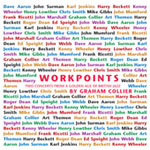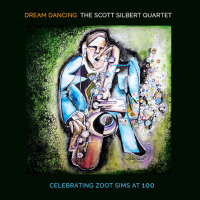Home » Jazz Articles » Graham Collier
Jazz Articles about Graham Collier
Graham Collier: Hoarded Dreams

by Roger Farbey
A fanfare of trumpets launches this most exciting but hard-to-describe live recording into its own orbit of jazz. It's part Charles Mingus, part Sun Ra, part Duke Ellington, part Carla Bley, but all original, captivating the listener's attention immediately and not letting go. Following the frenetic opening of “Part 1 and a relatively frenetic opening to “Part 2, the tension eases into a more relaxed and almost rock-based 4/4 feel. “Part 3 begins contemplatively with an interwoven guitar soloing between ...
Continue ReadingGraham Collier: Workpoints

by Peter Aaron
While leading figures like George Shearing, John McLaughlin, Evan Parker and Derek Bailey have long been revered, many pundits still greet the topic of early British jazz with a smirk and a wink--no doubt due to the high profiles of hokey Dixieland revivalists like Chris Barber and Acker Bilk. But thanks to a spate of new ear-opening reissues like Proper's four-CD Jazz in Britain: 1919-1950, Honest Jons' London is the Place for Me series, the recent Tubby Hayes releases on ...
Continue ReadingGraham Collier: Workpoints

by Nic Jones
With the often dubious benefit of hindsight it's possible to see bassist/composer/bandleader Graham Collier as something of a catalyst in the British jazz scene of the late 1960s and 1970s. The two discs here certainly lend substance to that impression, bringing together two different bands, with only Collier himself and trumpeter/flugelhornist Harry Beckett common to both, and two different sets of original Collier compositions.
Of these, “Workpoints" is significant because it was the first jazz work to receive a grant ...
Continue ReadingGraham Collier: Workpoints

by Jerry D'Souza
Graham Collier's emergence in the sixties heralded the presence of a jazz musician with a fertile and unbridled imagination. His voice was adventurous and provoking, and it helped underline the fact that jazz in Britain was setting a tone of its own. When the Arts Council of Britain commissioned its first work for jazz, the honour went to Collier, who created Workpoints. The suite had its premiere in 1968, and now almost forty years later it has been released for ...
Continue ReadingGraham Collier: Workpoints

by John Kelman
As British jazz entered the '60s, it began developing its own complexion. While still unquestionably indebted to the American roots that dominated prior decades, it acquired a more defined aesthetic that combined improvisation and composition in ways which were far removed from the earlier blues and American Songbook sources, yet it still remained rooted in basic tenets such as swing.
Not to suggest that British artists weren't paying attention to developments taking place across the Atlantic, but an important shift ...
Continue Reading

















